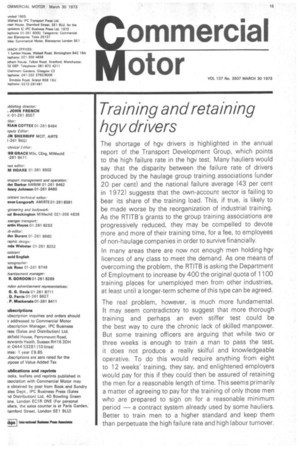Training and retaining hgv drivers
Page 15

If you've noticed an error in this article please click here to report it so we can fix it.
The shortage of hgv drivers is highlighted in the annual report of the Transport Development Group, which points to the high failure rate in the hgv test. Many hauliers would say that the disparity between the failure rate of drivers produced by the haulage group training. associations (under 20per cent) and the national failure average (43 per cent in 1972) suggests that the own-account sector is failing to bear its share of the training load. This, if true, is likely to be made worse by the reorganization of industrial training. As the RTITB's grants to the group training associations are progressively reduced, they may be compelled to devote more and more of their training time, for a fee, to employees of non-haulage companies in order to survive financially.
In many areas there are now not enough • men holding hgv licences of any class to meet the demand. As one means of overcoming the problem, the RTITB is asking the Department of Employment to increase by 400 the original quota of 1100 training places for unemplOyed men from other industries, at least until a longer-term scheme of this type can be agreed.
The real problem, however, is much more fundamental. It may seem contradictory to suggest that more thorough training and perhaps an even stiffer test could be the best way to cure the chronic lack of skilled manpower. But some training officers are arguing that while two or three weeks is enough to train a man to pass the test, it does not produce a really skilful and knowledgeable operative. To do this would require anything from eight to 12 weeks' training, they say, and enlightened employers would pay for this if they could then be assured of retaining the men for a reasonable length of time. This seems primarily. a matter of agreeing to pay for the training of only those men who are prepared to sign on for a reasonable minimum period — a contract system already used by some hauliers. Better to train men to a higher standard and keep them than perpetuate the high failure rate and high labour turnover.










































































































